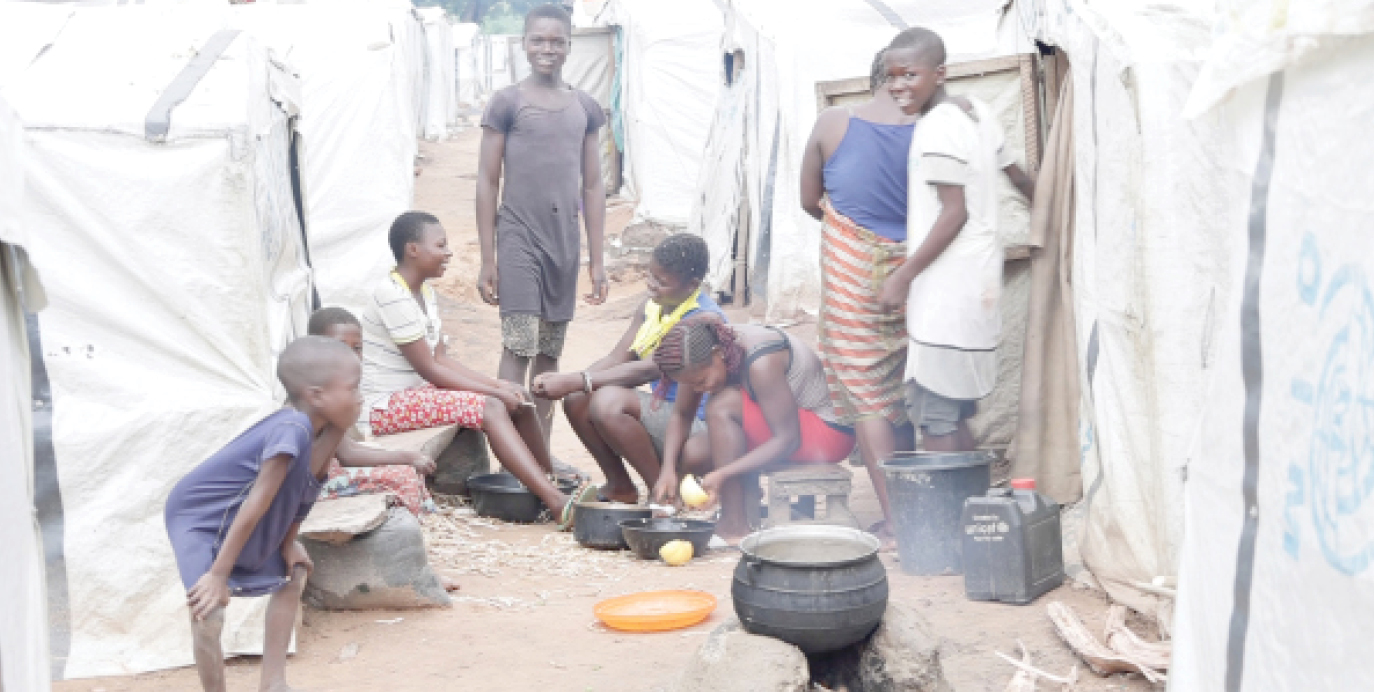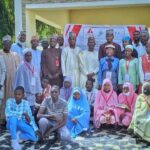Insecurity challenges in Borno State (North East) and Benue State (North Central) have created a huge humanitarian crisis with millions of internally displaced persons (IDPs) in both states.
The crises have especially taken a toll on women and children, many of whom have been rendered widows and orphans.
An investigation Daily Trust uncovers sharp practices by aid workers that have left these vulnerable IDPs in a state of paranoia.
A large, black pot is placed on three big stones between which are burning chunks of coal. Peeping inside the pot, a middle-aged woman clears perspiration from her face even as she battles with the cloud of smoke surging from the fireplace towards her.
Holding a large wooden spoon, she stirs corn flour as breakfast for her malnourished children. Smaller clay pots, wooden mortars, and pestles also lie about elsewhere just as logs of firewood lean against one of the many fragile tents that serve as shelters for the over 5,000 IDPs at the Daudu camp.

If you have seen one of these tents, you have seen them all. The interior is as damp as the murky marshes that surround the entire environment.
The dingy corners inside provide sanctuaries for a multitude of malevolent mosquitoes and even rodents. The occupants of these shacks, looking more like medieval cages, complain they are constantly faced with the sights and sounds of their amphibious neighbours who breed and luxuriate in the stagnant waters around them.
Orphans, widows recount sad tales
Mbaikpeveyor Mkoholga, a 55-year-old widow and orphan, including her seven children are among the occupants of this sprawling IDP camp located at Daudu in Guma Local Government Area of Benue State.
“I was brought to this place in 2018 as a result of attacks by herders. While at the camp, I lost my parents; they all got sick and died. I also lost my husband leaving me with eight children (seven boys and a girl); the youngest is one year old.
“Feeding has been difficult because we barely get enough food supplies from the government to sustain us. We resort to doing menial jobs within the host community to survive. Government should come to our aid,” she said while dishing her maize flour meal in local plates.
At another tent, Rosemary Iorpuu (65) sits by a fireplace with her seven kids. She is also stirring corn flour for the morning meal. Her story is similar; she is an orphan and widow who was brought to the Daudu Camp-one in 2018 following a raid on their community in Guma Local Government Area by suspected herders.
“While in the camp, my husband got sick and died. Earlier I had lost my parents. I am here in the camp with seven kids (four boys and three girls) whom I find it difficult to feed. We are practically starving because what comes from the government barely sustains us. Even our tents are leaking and whenever it rains we get drenched,” she said.
Rebecca Tior (45) is another IDP at the Daudu Camp-one who was brought there in 2018 following an attack on their community also by suspected herders.
“My husband was killed during the crisis leaving me with eight children (seven boys and a girl). The government, through SEMA, brings food supplies but not enough. As a result, we go out to do menial jobs and work on the farms of people to survive.
“We don’t even have a borehole here; we trek a long distance to get water from streams in the host community. Our tents are broken and we sleep on the bare floor. Whenever it rains, we stay awake throughout the night. Government should come to our assistance. We want an end to this crisis so we can go back to our homes,” she said.

Abagana IDPs while away time under neem tree
It was 11 am when this reporter got to the Abagana IDP camp located on the outskirts of Makurdi, the capital of Benue State. Seated under a large neem tree was a group of male IDPs who whiled away time playing card games.
They said card playing and other indoor games have become their way of warding off hunger and temporarily forgetting about their sorrow.
Indeed, hunger has driven the IDPs at Abagana into several other necessities. Every morning, some of them, especially males are conveyed in trucks to farms in some LGAs where they work for pay.
This much was confirmed by David Iorkyaa, the camp chairman who said the government was no longer providing food at the camp.
“Government said it has become tired of feeding us; leaving people to hustle to fend for themselves. It now takes up to three to four months before food is brought here and even at that it is barely enough to go round,” Iorkyaa said.
Azande Ephraim who was driven to the camp from Guma LGA in 2018 said: “We gather under this tree to play games in order to forget our sorrows and reduce negative thoughts.
“As you can see, the shelters here are in poor shape; when it rains, it becomes a disaster. We used to be attended to by ‘Doctors without Borders’ but they are no longer available so we are on our own,” Ephraim said.
The story of Ngodoo Yakubu (12) is heart-wrenching. Her parents were killed during a raid on their community leaving her with four siblings. But while at the IDP camp she lost two of them.
“I and two other surviving siblings go about doing menial jobs on farms and homes to survive. We are no longer in school. I want the government to assist us to go back home so we can continue our education,” Ngodoo said.
How sharp practices worsened things
An investigation by Daily Trust reveals that Benue State presently has thousands of IDPs across seven LGAs, namely Guma, Gwer-West, Makurdi, Logo, Konshisha, Oju and Agatu. Out of this number 46, 887 are children between 0-5 years while the total number of adults from 18 years and above are 194,740.
Findings also show that the total number of pregnant IDPs in Benue stands at 5,832 while nursing mothers are 6,228 and those aged 60 and above is 1,770. The breakdown also indicates that there are 1,032 injured IDPs, 98 sick while 218 are malnourished.
Documents obtained by Daily Trust show that in 2018, the Benue State Emergency Management Agency (BESEMA) spent N46 million out of N50 million budgeted for the rehabilitation of IDPs.
Similarly, the state budgeted N170 million in 2019 for relief materials but the actual amount spent was zero naira, while N30 million was budgeted for rehabilitation of IDPs but only N15,000 was actually spent.
In 2020 the state budgeted about N25.5 million for relief material/camp management as well as rehabilitation of IDPs but got zero naira in actual capital expenditure.
Under its 2020 Recurrent Expenditure, the budget for BENSEMA was N112 million even as actual expenditure of N79.4 million and N86.25 million were said to have been expended on payment to the aged/vulnerable groups and COVID-19 protective and relief material for IDPs.
Going by what is captured in the Benue State Audited financial statement, the state government has been spending about N6 million on IDPs monthly between 2018 and 2020 with the lowest amount of N15,000 in 2019 and the highest in 2020 with N166 million.
While some analysts say BENSEMA is poorly funded based on what is captured in the state’s audited financial statements of 2018-2020, others say even the funds purportedly spent by the agency do not match what is on the ground at the IDP camps.
Earlier, the Minister of Special Duties, George Akuma, had accused the state government of deducting N200 million monthly for IDPs in the state.
The Executive Director, Community Link and Human Empowerment Initiative, a Makurdi-based NGO, Dr. Helen Teghtegh, said “the general condition of Benue IDPs is not good, to say the least.”
“Shelters are not good, no food while host communities are stressed with their limited resources and as a result, they are becoming more vulnerable. There is also child labour and no secondary education for orphans especially and the widows are heads of their households. Most of them are still living in trauma.
“Recently, in my interactions with them (IDPs), I discovered a host of them take their bath without soap. They just pour water over their body and that’s it. You see all manner of skin infections. They pile up dirty clothes and just soak them in water and dry them. I am not talking about food yet,” she said.
Asked if she believed corruption was at play in managing the IDPs in Benue, Helen said: “Can you talk about Nigeria and leave out the element of corruption? The answers are obviously obvious. Ask for the total monies spent on the feeding of IDPs in comparison with the upkeep. Then you will find your answer.”

BENSEMA keeps mum
Efforts to speak with the Benue State Emergency Management Agency (BENSEMA) yielded no fruitful results as the Executive Secretary, Emmanuel Shior, failed to respond to inquiries on the matter. He ignored questions sent to him via text message to respond to the issues.
In Borno, IDPs devise ‘survival tactics’
The scorching Maiduguri sun notwithstanding, scores of IDPs at the Teachers’ Village camp, Bolori, as well as that of Bakassi located along Damboa road filed out to tell their stories.
It was a tug of war controlling those at the Teachers’ Village as they almost ‘mobbed’ this reporter and his cameraman as they struggled to be allowed to speak first.
Led by their caregiver, a group of malnourished children aged between four and eight years were the first to be brought before our camera.
Ladidi Usman (also an IDP), who is the caregiver, said the children whose parents or relatives are not known, were brought to the camp from Baga in 2015 as a result of the Boko Haram attacks.
“I took it upon myself to bring them here from Baga but it has not been easy catering for these orphans.
“Whenever government supplies food we give them but it is hardly enough. Sometimes it takes up to 2-3 months before food is brought here. Government should assist for the upkeep of the orphans,” she said.
As the crowd of IDPs became uncontrollable in their desperate attempt to have their voices heard, Musa Umar, 16, wriggle through and stood in front of our camera.
With his sweat-soaked face, Musa yelled: “I am also an orphan; I came here as an IDP in 2018 after the killing of my parents in 2017 by Boko Haram. My aunt is also here. We don’t get regular food from the government and whenever I am sick I take care of myself.
“I go about doing menial jobs to fend for myself. Government should feed us. I want to go back home and continue my education.”
Next to speak was Mariam Mustapha, a 45-year-old widow who said she came from Kukawa with six children, all orphans seven years ago.
“It has been difficult taking care of these children whose parents were killed by insurgents. We don’t get regular food from the government and as a result, we do menial jobs to buy food. Government should come to our aid,” Mariam said.
Abdulrahman, 12, from Baga, said his father was killed by Boko Haram while his mother died of high blood pressure.
“The guardian who was taking care of me fell off a staircase and got fractured and I was brought here as an IDP. Feeding has not been easy; I do go out to do menial jobs to survive. Government should do something to end this crisis so I can go home,” he said.
Another orphan, Haruna, 12, from Baga said his parents were killed by Boko Haram. He was then brought to Maiduguri along with his five siblings and they survive by hawking sachet water in the neighbourhood.
“We are suffering from hunger. We go around doing menial jobs and housework to survive,” he said.
At Bakassi camp, female IDPs survive through prostitution
The Bakassi IDP camp located along Damboa road, Maiduguri is home to 41,805 IDPs from 6,831 households. It was set up on January 25, 2015, and has over 300 orphans and over 3,000 widows.
Like elsewhere, the IDPs here have tales of sorrow and anguish to tell. They say food is in short supply. Sources at the camp told Daily Trust that banditry in the North East and North West has contributed to the shortage of food for the camp.
“Food supplied here used to be purchased from Kebbi, Zamfara, and Katsina but with the rising incidences of banditry there, farmers no longer produce food. This has not only led to a shortage of food but also its high cost as it has affected supply to this place,” said an official at the camp who wouldn’t want his name revealed.
The official also revealed that the pathetic situation at the Bakassi camp had forced many female IDPs into prostitution as a means of survival, a development that has resulted to several unwanted pregnancies.
Daily Trust also found out that sharp practices by the Borno State Emergency Agency (BOSEMA) have contributed to the deplorable conditions of IDPs in the state.
A humanitarian worker in Maiduguri accused BOSEMA of shortchanging IDPs in terms of food and other supplies. “Basically food meant for the IDPs comes from government and NGOs. Initially, NGOs used to supply food directly to the camps but that has been changed.
“What obtains is that all donations (food) to IDPs from NGOs are now channeled through government (via BOSEMA); even UN agencies’ interventions follow this pattern which leaves little room for accountability,” said the humanitarian worker who wouldn’t want his name in print for fear of being victimised.
According to the source, corruption is perpetrated by SEMA staff who keep food meant for IDPs in their stores but do not distribute it. Instead, half of the food items meant for IDPs are distributed to BOSEMA staff while “fake and expired food items are given to IDPs. They even repackage the food in bags and sell.”
“As a result, many hungry IDPs go out of their way to look for food and in the process, they run into social problems such as prostitution. Many of them end up with unwanted pregnancies, In fact, there is a particular IDP camp here in Maiduguri where abortion is done and unwanted babies buried in soak-away,” said the source.
Allegations unfounded – BOSEMA
The Borno State Emergency Management Agency (BOSEMA) has however denied allegations by the IDPs of food shortage and diversion saying they are unfounded.
Alhaji Abdullahi Isa, BOSEMA director of Planning, Research, and Statistics, said: “We are adequately feeding the IDPs in collaboration with the World Food Programme. The state government provides monthly condiments.
“Besides, the government goes round to give food that would last for 50 to 60 days. Those causing problems are ‘professional’ IDPs,” Isa said.
On the allegation of some female IDPs getting impregnated, he said it was a normal occurrence in such societies. “The IDPs are the ones doing some of these things to themselves,” he said adding that the state government has zero-tolerance for relief (food) diversion.
“This government is serious in dealing with IDPs; there is zero-tolerance for diversion; there is transparency and accountability. The governor can sack one for diverting even a bag of rice,” Isa said.

Inside ‘market’ where items meant for IDPs are sold
Located right in front of the popular Ramat Polytechnic along Bulumkutu road in Maiduguri is a ‘black market’ where items meant for internally displaced persons (IDPs) are sold.
Known as Bakin Yelwa, Daily Trust caught up with some sellers and buyers at this market, among them security operatives. Curiously, those selling the items are also IDPs who said they were pushed into the business in order to survive.
One of them who wouldn’t want to be named said: “We get these items from other IDPs at the camps. When they are shared to some IDPs who lack what to eat, they sell them to us and we in turn bring them here to sell and get what to eat. We do this to survive because the food we get from the camps barely sustain us.”
Among the items on display at the market were: mattresses, bedspreads, blankets, and cooking utensils such as pots.
How we rehabilitated IDPs—Commissioner
The Borno State Commissioner for Reconstruction, Rehabilitation, and Resettlement, Engr. Mustapha Gubio said the state government has constructed a total of 10,000 houses for resettlement of IDPs across the state.
He also disclosed that 25,000 houses were reconstructed in communities ravaged by Boko Haram activities. “My ministry has also worked with line ministries such as those of women affairs, health, water resources, and education in areas of intervention.
“When it comes to widows and orphans we have a special programme which was launched in Monguno by the governor himself. He registered about 5,000 orphans with a view to bringing them to school here in Maiduguri while some are sent to special schools across the country.
“With regards to widows, we make sure we give them special consideration by allocating houses to them while their orphaned children are also catered for in terms of education.
It would be recalled that in August 2020, Governor Babagana Umara Zulum had during a meeting with members of the Senate Committee on Special Duties who were in Maiduguri for oversight on North East Development Commission and National Emergency Management Agency (NEMA), reportedly lamented: “This government has harvested a total number of 53,911 widows and about 54,000 orphans.
“The unofficial number can triple these figures. Where are we taking them to? I am calling on the committee to quickly examine the situation in Borno State otherwise it will consume the entire nation.”
This investigation was carried out with the support of MacArthur Foundation through Daily Trust Foundation

 Join Daily Trust WhatsApp Community For Quick Access To News and Happenings Around You.
Join Daily Trust WhatsApp Community For Quick Access To News and Happenings Around You.


